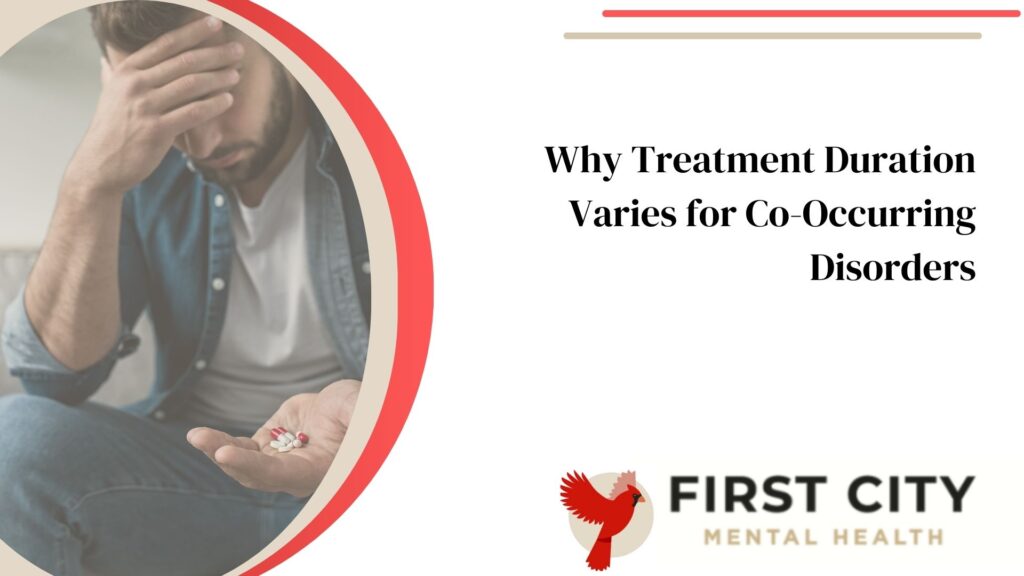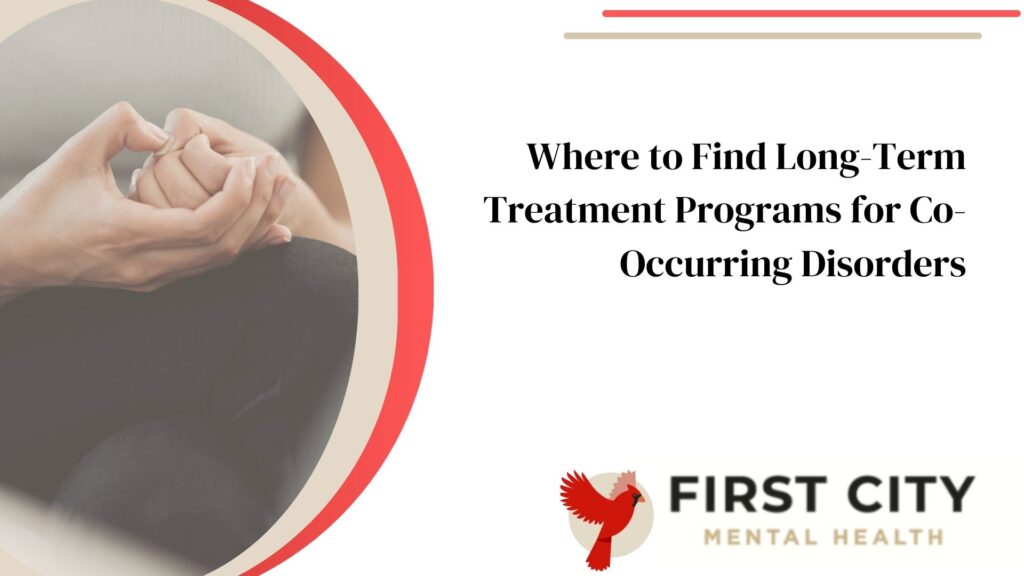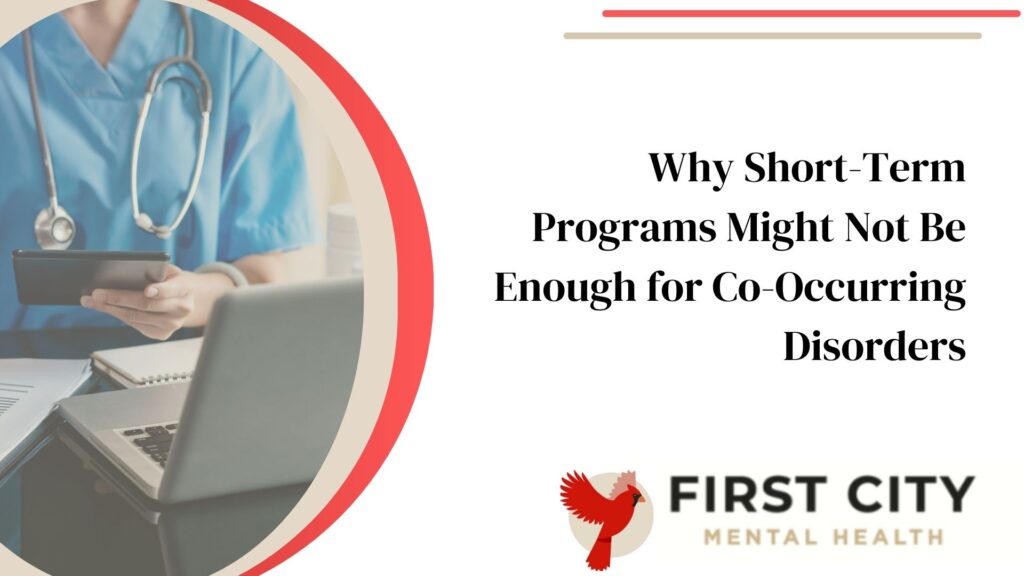
Why Choose A Holistic Approach In Co-Occurring Disorders Treatment?
January 21, 2025
How Do You Recognize if You Need Co-occurring Disorders Treatment?
January 21, 2025Dealing with co-occurring disorders can feel overwhelming. You may be wondering how long co-occurring disorders treatment will take to see some progress. Dual diagnosis, involve having both a mental health issue and a substance use problem at the same time. Numerous mental health conditions frequently manifest alongside substance use disorders, highlighting the prevalence of such dual diagnoses and the importance of targeted treatment approaches.
These conditions often need more extended treatment periods compared to single disorders due to their complexity.
One important fact is that treating co-occurring disorders typically requires addressing both conditions together through an integrated approach. This means more time is necessary for effective recovery.
In this blog post, we’ll explore the factors affecting the length of treatment, how progress is measured, and when you might expect to see improvements.
Wondering where to start? Keep reading!
Key Takeaways
- Treatment for co-occurring disorders often takes longer than single disorders. This is due to the need for an integrated approach.
- Factors like severity, trauma, and individual diagnoses affect how long treatment lasts.
- Progress in treatment varies. Some see changes in weeks, others take months or even a year.
- Long-term programs provide better support by addressing both mental health and substance issues together.
- Regular assessments track improvements and help adjust treatment plans as needed.
What Factors Affect the Length of Co-Occurring Disorder and Substance Use Disorders Treatment?
Factors Affect the Length of Co-Occurring Disorder Treatment in Kokomo, Indiana?
- Severity of Disorders: More severe cases, such as anxiety disorders, need more prolonged treatment.
- Prenatal Brain Damage: Such damage may extend treatment time.
- Viral Infections: These can slow down progress in recovery.
- Psychological Trauma: PTSD, bipolar disorder, and other traumas can lengthen treatment.
- Type of Therapy: Counseling, psychotherapy, and support groups all influence duration.
- Individual Diagnoses: Each case needs a specific plan, affecting how long it takes.
- Symptom Severity: More intense symptoms often require extended care.
- Treatment Options: The mix of traditional and alternative therapies affects timeframes.
Each factor plays a crucial role in determining how long co-occurring disorders treatment takes.
Why Treatment Duration Varies for Co-Occurring Disorders

Effective co occurring disorders treatment involves a combination of therapies customized for each individual. This complexity makes the duration vary widely. “Individuals often face intricate medical and psychological issues that require extended treatment.”
The severity of both mental health disorders and substance use disorders also affects how long someone needs therapy. Causes like prenatal brain damage and viral infections might extend recovery time.
No universal approach exists, given the diverse diagnoses in co-occurring disorder cases.
How Is Progress Measured During Co-Occurring Disorder Treatment?
Individual responses to treatment vary greatly. Progress in integrated treatment for co-occurring disorders can be measured by improvements in symptom management and coping skills. Medication and behavioral therapy play key roles.
Effective options include psychotherapy, self-care practices, and support groups.
Early diagnosis helps track progress better. Treatment for co-occurring disorders aims to reduce symptoms while empowering individuals to handle daily challenges more effectively. Regular assessments ensure the individual is progressing toward recovery goals.
When Can You Expect to See Improvements in Co-Occurring Disorder Recovery?
Progress tracking ensures that individuals get the right support during treatment for co-occurring disorders. Signs of improvement can appear in different stages of recovery. Some people see changes within a few weeks, while others may need months.
Varies based on each person’s needs—many experience better mental clarity and mood, and a reduction in mental illness symptoms, after the first month. In integrated treatment for co-occurring disorders, sustained progress often happens over several months to a year.
Consistency in attending therapy sessions helps quicken this process.
Where to Find Long-Term Treatment Programs for Co-Occurring Disorders

Long-term treatment programs for co-occurring disorders provide crucial support. Mental health care facilities in Kokomo, Indiana, offer a wide range of options, including specialized mental health services. These programs address both mental health issues and substance use disorders simultaneously.
Dual diagnosis treatment centers in Kokomo, Indiana, cater to individual needs. They design specific plans for each person seeking help. Adult co-occurring disorders treatment is available and customized for adults needing long-term care.
Finding the right program ensures better outcomes and long-lasting recovery with co-occurring disorders treatment centers.
How to Know If You Need Extended Treatment for Co-Occurring Disorders
Finding the right adult co-occurring disorders treatment is essential. You might need extended treatment if your symptoms persist or worsen despite initial care. The severity of both mental health and substance use disorders, such as substance abuse, often requires longer treatment.
Regular reviews of progress can help decide if more therapy is necessary.
Multiple triggers or stressors may also signal the need for ongoing comprehensive care. Individualized options like counseling and support groups offer extended support when needed.
Persistent issues with symptom management indicate a reevaluation for continued co-occurring disorders treatment in Kokomo, Indiana, could be crucial to recovery success.
What Are the Phases of Integrated Treatment for Co-Occurring Disorders?
Co-occurring disorder treatment involves several key phases. Each phase focuses on different aspects of recovery.
Assessment
Professionals evaluate mental health and substance use issues. They identify specific needs and create a personalized plan for treatment for co occurring disorders.
Detoxification
This phase clears the body of harmful substances, addressing drug abuse and its impact on mental health. Medical supervision ensures safety during detox.
Stabilization
Clients receive care to manage withdrawal symptoms. Stabilization helps prepare for further treatment stages.
Rehabilitation
Programs provide therapy and counseling sessions. Clients learn coping strategies and skills for daily life.
Maintenance
Ongoing support helps prevent relapses. Regular check-ins track progress and offer encouragement.
Aftercare Planning
Professionals develop a long-term recovery plan. Aftercare ensures support continues after leaving the program.
Continued Monitoring
Follow-up appointments assess ongoing progress. Adjustments to the treatment plan can be made if needed.
Support Groups
Participation in groups offers peer support and shared experiences. These groups help maintain sobriety and mental health stability.
Education for Families
Programs provide information to loved ones on supporting recovery efforts at home.
These phases ensure comprehensive care in co-occurring disorders treatment programs like those available in Kokomo, Indiana.
Why Short-Term Programs Might Not Be Enough for Co-Occurring Disorders

Short-term programs often fail to cover the complex needs treatment of co-occurring disorders. These disorders involve both mental health and substance use issues, including various mental illnesses, making treatment more complicated.
Patients may need longer durations of therapy and medication adjustments, and short programs might not provide enough time for this process.
Early diagnosis is critical but hard to achieve in short-term setups. People facing these issues require extended care that includes counseling and support groups over months or even years.
Without sufficient time, emotional self-harm risks increase, highlighting the gaps in short-term solutions. Long-term approaches better address these multifaceted challenges.
Final Thoughts
Treatment for co-occurring disorders treatment program often takes longer due to their complexity, especially when substance use disorder (SUD) is involved. Success depends on personalized care and commitment. Start by seeking programs that offer long-term support.
Look out for signs of progress, such as reduced symptoms and improved mood. Recovery is a journey, not a sprint.
Find resources to help you on this path today!
F.A.Q.s
How long does treatment for co-occurring disorders in Kokomo, Indiana, usually take?
The length of treatment for co-occurring disorders in Kokomo, Indiana, can vary. It often depends on the individual’s needs and the severity of their conditions.
What factors influence the duration of treatment for co-occurring disorders?
Several factors can affect how long treatment for co-occurring disorders takes. These include the type and severity of both mental health issues and substance use problems.
Is there a standard timeframe for treating co-occurring disorders?
There is no set timeframe for treating co-occurring disorders since each person’s situation is unique. Treatment plans are tailored to meet individual needs.
Can short-term programs be effective in treating co-occurring disorders?
While some people may benefit from short-term programs, many find that longer treatments offer better results when addressing complex issues related to co-occurring disorders. Integrating substance abuse treatment with mental health care is crucial, as co-occurring disorders are more effectively addressed when both issues are treated simultaneously.






